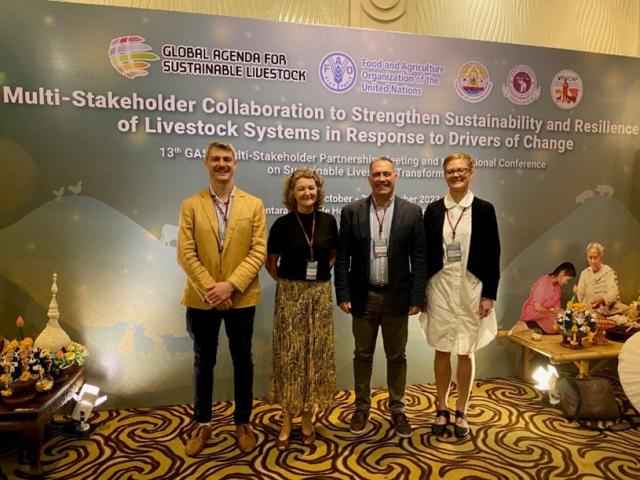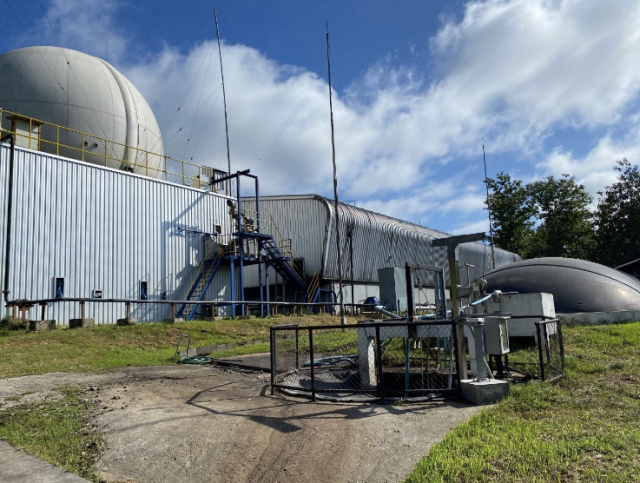Beef + Lamb New Zealand (B+LNZ) recently participated in the United Nations Food and Agriculture Organization (FOA) Global Agenda for Sustainable Livestock (GASL) conference held in Chiang Mai, Thailand.

Figure 1 B+L NZ and Australian agricultural representatives with Thai wagyu farmer and wagyu bull
B+LNZ's Senior Trade Policy Advisor (Environment), Nick Jolly, attended the conference, funded by the UN FAO, as part of a broader Oceania delegation. The group included representatives from Australian sheep and beef industry organizations, the Global Roundtable for Sustainable Beef, New Zealand's Ministry for Primary Industries, and AgResearch.
The conference aims to bring together those involved in the livestock industry from around the globe to focus on shared challenges.
This year, with it being held in Thailand, there was significant focus on South-East Asian systems and developing countries. While this was less relevant to New Zealand farmers, the event provided valuable opportunities to meet with representatives from countries such as Australia, Canada, and Ireland where we share similar challenges and opportunities.
Mr Jolly shares key insights from the conference below.

Figure 2 B+L NZ, AgResearch and MPI representatives at UN FAO GASL
Thailand as the hub
Thailand, with its vibrant livestock industry, served as an ideal host for the UN FAO GASL conference. During the week, delegates visited local farms, engaging with Thai farmers to understand their challenges.
I was particularly impressed by their dedication to biosecurity, with disinfectant washes for all vehicles entering the dairy processing company we visited. We visited a dairy farm and saw how they were using a worm farm to get rid of manure, after which they sold the resulting fertiliser to market gardeners and rice farmers.
We also visited the university to learn about the biomethane digestors for food and animal waste that were being rolled across the country, with over a thousand in place already.

Figure 2 Biomethane digestor in Thailand
The Australians organised a separate visit to a Wagyu beef farm, showcasing an impressive operation with rotational grazing and a unique marketing approach that involved selling beef directly to consumers in a restaurant.
The farm also sold wagyu genetics into the local dairy industry to provide additional value to their non-replacement calves.
Challenges facing livestock producers internationally
The conference delved into the global challenges faced by livestock farmers, emphasising sustainability, climate change, and productivity. Discussions highlighted opportunities in improving nutrition and disease management.
The conference also included concrete examples of sustainable agriculture around the world that the UN FAO was supporting such as:
- The use of an invasive tree in Thailand that was blended into a nutritional supplement for cattle along with molasses. Natural tannins in the plant also had a side benefit of reducing biogenic methane emissions.
- Use of insects to address food waste and provide feed for poultry.
What was clear to me was that New Zealand farmers are incredibly well placed to supply high quality, sustainable and ethically produced red meat into growing international markets around the world.
Looking ahead
Looking ahead to the medium and long term, we are going to see demand for red meat rise in Southeast Asia and Africa, with significant increases in middle-class consumers forecasted while productivity challenges remain for farmers in those markets.
While New Zealand production is unlikely to grow due to competition with other land uses, other countries also face significant headwinds to their growth with a changing climate and biosecurity, both major issues internationally.
New Zealand is relatively well insulated from these challenges due to our temperate island climate and strong biosecurity system, however around the world others are already beginning to feel the impact of climate change with more droughts, floods, and higher temperatures.
This is causing conflict between nomadic pastoralists and farmers over animal feed and has resulted in civil war and food shortages in some countries. In developed countries such as Australia, higher temperatures and droughts are causing farmers to destock ahead of a severe El Niño and there is elevated risk of biosecurity outbreaks from diseases being blown over in storms from neighbouring countries.
It was useful to understand where countries similar to New Zealand were at, and a conversation with an Irish scientist whose research focussed on methane inhibitors for livestock highlighted they are focussed on similar issues to New Zealand due to their pastoral systems. This is an area where the New Zealand Government has recognised that there is value in working together and in 2022 signed a joint research mechanism with Ireland’s Government on climate and agriculture.
Building partnerships
The conference facilitated networking opportunities that allowed B+LNZ to establish meaningful partnerships with stakeholders across the global livestock supply chain.
This aligns with existing collaborations through groups like the Global Roundtable for Sustainable Beef and the Global Sheep Forum, emphasising the importance of face-to-face interactions.
Through these conversations, it highlighted that many of the challenges facing countries around the world are ones that New Zealand doesn’t have to face, thanks to our rigorous biosecurity system, our world class agricultural scientists, industry bodies, and processors working together to support farmers.
New Zealand is viewed as a leader and while we have challenges to address, we are incredibly well placed to meet them.